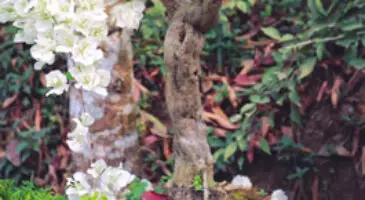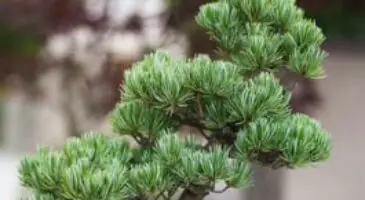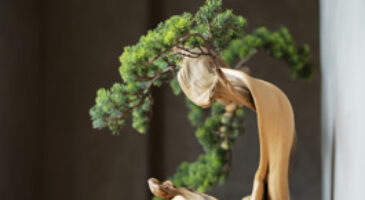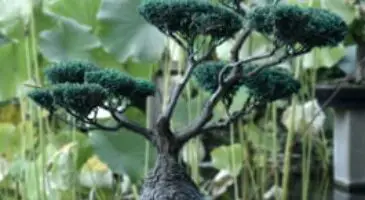Table of Contents
Bonsai trees always help improve your home’s beauty and ambience. This is because they are well-matched with pots and enable you to place them anywhere in the house. But what if you have pets like cats? Are bonsai trees poisonous to cats? I am going to talk about them.
Bonsai trees and plants are grown in clay pots or containers, giving a more beautiful appearance, even from those growing in the wild. These plants are part of Japanese culture and artistic tradition, which has grown in popularity because of people’s nature and climate.
Some species of bonsai plants can be harmful to cats, including azalea and some others. They can be fatal if your cat consumes them in large amounts.
Are bonsai trees toxic to cats
If you recently adopted a cat as a pet, you will know that cats love to chew on almost anything that attracts their curiosity. Yes, this also includes your favorite bonsai plant.
Bonsai trees represent art, spirituality, and peace. But not all species of bonsai plants are harmless, especially if you are a cat owner. Bonsai trees do have toxic effects if they are eaten by your cat.
Besides bonsai, other plants defensive methods against intruding animals. It is important to be aware of some of these risks if you plan to have or grow new bonsai or any other plant in your home. Do extensive research and take necessary precautions.
Are juniper bonsai trees poisonous to cats
Juniper bonsai is one of the most popular outdoor plants. Unfortunately, they are toxic to animals, including cats. If they consume many leaves from these plants, it may lead to stomach upset and abdominal pain in your pet. In addition, the toxic substances in juniper plants may cause anemia in your pet.
Are ficus bonsai trees poisonous to cats
Yes, ficus bonsai trees are also harmful to cats. Although the toxicity level is mild, you should not take any risks for your beloved pet. If you still want to have these bonsai plants in your home, be aware of some most common symptoms. These, include burning your cat’s skin, a loss of appetite, vomiting, diarrhea, and knee pain.
Also, your cats may also suffer from gastrointestinal tract distress and/or mouth irritation. Ficus Bonsai trees include annoying snake saps. Gets snake saps on their skin, they are more likely to get skin irritation
Are azalea bonsai trees poisonous to cats
They are known for their gorgeous appeal and beauty in homes, but they, too, are equally toxic to both humans and cats.
Azalea has been identified as a type of rhododendron. The whole Satsuki Azalea Bonsai plant is also toxic. Its toxicity is found in roots, stems, and leaves.
If your cat eats a small amount of azalea plant, it may begin to experience some of the symptoms. Some of the most common signs include vomiting, diarrhea, and severe kneeling. In severe situations, symptoms include tremors, loss of appetite, and the risk of a coma.
Are dwarf bonsai trees poisonous to cats
Yes, Dwarf Crepe Myrtle Bonsai trees are harmful to cats. According to experts, all parts of this plant, including leaves, speed, and stem, are poisonous to cats. The dwarf bonsai includes a chemical called cycasin, which is the leading active toxic agent.
Are gardenia bonsai trees poisonous to cats
The gardenia plant is also referred to as Cape jasmine, has bright white, beautiful flowers with dark green, shiny leaves. The flowers, leaves, and stems of this species of plant may cause stomach upset in cats. If your pet chews a part of this plant, it leads to vomiting, diarrhea, and or even a hives outbreak.
Poisoning is rarely deadly with the Gardenia plant. It can be easily cured by a veterinarian. But, it doesn’t mean it is not a severe condition. So, if you notice any signs of gardenia poisoning or see your pet chewing a part of gardenia bonsai, immediately contact a veterinarian to consult for treatment options.
Are Chinese elm bonsai trees poisonous to cats
Experts do not recommend feeding cats any plant other than grass. The Chinese elm bonsai can survive indoors, are safe if eaten, but Chinese privates should be avoided. Even if these bonsai plants are non-toxic, they should be consumed in moderation.
Are Fukien tea bonsai trees poisonous to cats
Fukien tea bonsai is used in the Philippines as a medicinal plant to treat coughs, colic, diarrhea, stomach problems, and dysentery. Both the fruit and leaves are edible for cats.
But according to some veterinarians, Fukien tea bonsai trees are mildly toxic to pets and humans. Generally, eating can irritate the stomach and mouth and possible vomiting. Moreover, fuckien tea is used as an herbal remedy for stomach disorders and is harmless around pets.
Are jacaranda mimosifolia bonsai trees poisonous to cats
Jacaranda mimosifolia is famously loved for its spectacular display of large-bodied flowers, ranging in color from blue to purple, and fruit with flattened seeds. However, jacaranda bonsai trees are poisonous, and exposure to its pollen can cause a skin rash for your cat. Besides, eating seeds and flowers may lead to vomiting, nausea, and abdominal pain.
Are weeping willow bonsai poisonous to cats
The weeping willow bonsai belong to a fast-growing tree species, often found near rivers, in colder parts of Eurasia and North America. It is important to note that the willow tree’s wood is not toxic to cats and dogs. But, its bark can be harmful, especially to cats.
Moreover, the cats, which lack the ability to process the salicylic acid found in willow bark and aspirin, are mainly prone to toxic exposure.
Are all bonsai trees poisonous to cats
Not all bonsai trees are not toxic for cats. Some species include Sago Palm, Jade, Azalea, Japanese Juniper, Ficus, fig, Ambrosia Mexicana, and the list goes on. However, all of these bonsai trees contain toxic material that may cause your cat to suffer from vomiting, diarrhea, lethargy, black tarry stool, inappetence, and fluid buildup in the abdomen.
Which bonsai trees are not poisonous to cats
Many bonsai trees are harmless for pets. If you have cats in your home, you can choose those non-toxic species. It encourages you to enjoy your fun anywhere in your home and show your bonsai artistically in your home. You don’t have to worry about chewing your cat on a bonsai tree which is poisonous to cats.
I have listed below some species of bonsai plants that can be used to enhance the beauty of your home while protecting your cats.
- Bamboo palm
- Christmas cactus
- Japanese maple
- Foucault tea
- Hibiscus bonsai
Can cats be around bonsai trees
Cats can play around the bonsai trees, which are non-toxic to them, as I mentioned above. A lot of people reported that bonsai trees and their cats can live comfortably together; however, several breeds may be at greater risk. That’s why even a slightly harmless bonsai tree can be poisonous if eaten in large quantities.
For added safety, you should keep poisonous plants out of your cat’s reach. Depending on the toxicity level, a single bite can be deadly or traumatic. In short, all the endangered plants should not be considered if you own a cat or pet, and for some, you have to take some added steps to keep your cat safe.
What should I do if my cat poisoned by my bonsai
If your cat accidentally chews and consumes a portion of a toxic bonsai, it may lead to several health complications. So there are various treatment options to remove or eliminate harmful substances.
For example, if your cat chewed on some parts of a bonsai tree, you must provide first aid immediately. First, eliminate any bonsai substance from your cat’s mouth. Then, you can try to clean her mouth with water.
When you contact your doctor, monitor your cat’s symptoms. In severe examples, such as eating any part of a ficus bonsai tree, if your cat experiences difficulty breathing, take her to the doctor as soon as possible; otherwise, it could die. Be sure you know what kind of plant your pet has eaten so the veterinarian can recommend the best possible treatment.
Furthermore, find out which parts of a tree are poisonous. It can vary from species to species.
Conclusion:
Some bonsai trees are toxic to cats while others are not; if your pet eats the harmful bonsai, it may suffer from various health symptoms. Try your best to not let your pet consume any plant other than grass. We hope this article helps you make a more informed decision about bonsai trees.



